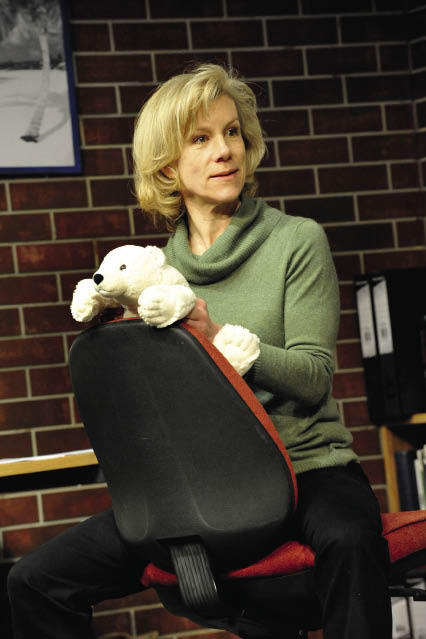Richard Bean is a creative nomad, a pix-and-mix sort of playwright who lights on subjects seemingly at random. He’s written about Brussels, racism, agriculture, social mobility and trawlermen. Now he’s taken on climate change and he’s hit the mark with delicious accuracy. This is his best play so far.
The Heretic is set in a university earth-sciences faculty where Diane, a paleogeophysicist, has found incontestable proof that sea levels aren’t rising. A decade ago she planted a betel nut tree on a beach in the allegedly drowning Maldives. But instead of sinking, the tree is thriving. Her departmental head, Kevin, tells her that her findings may damage the faculty’s ‘business model’ and endanger a juicy contract with a top firm of eco-insurers. ‘I thought I worked in a university,’ she says. To which Kevin (played by James Fleet with his usual tousled charm) offers his wholehearted agreement.
He wishes the faculty could ditch its ‘centre of excellence’ status and return to the good old days when it was ‘a centre of ducking and diving and falling asleep in the afternoon’. Diane ignores his advice, publishes the data and is threatened with suspension.
Bean’s stroke of brilliance here is to make Diane and Kevin former lovers who still fancy each other so the arguments about the planet are played out in the idiom of the marital tiff. This keeps the tone pleasantly frivolous throughout. And it’s a joy to see a playwright who refuses to take anything seriously. Diane’s bulimic daughter is the butt of constant jokes. ‘Come on,’ says Diane, dragging her off to lunch. ‘I need to eat and you need to eat and throw up, which takes longer.’ Bean also finds room for gags that must have been rolling around in his head for ages. A fresher tells Diane that he took a year off. ‘What did you do?’ ‘Nothing. Like I said, I took a year off.’
The second act dramatises the email hoo-ha that engulfed the IPCC back in 2009. Bean pulls off a couple of nifty feats here. He makes emails theatrical, and abstruse science understandable. By introducing the details at a gentle pace he tutors us in the jargon so that a phrase like ‘paleo-climate proxy temperature reconstruction’ slips down easily enough and one starts to understand why tree rings, though rather inaccurate as thermometers, are favoured by the earth-boilers and planet-toasters.
The play closes with an absurd and defiantly romantic ending which may be a subtle rebuke to the defeat-crazed doom-wallowers and fear-fanatics of the pro-warming alliance. There are a zillion reasons to see this fabulous play, not least a terrific light-touch performance from Juliet Stevenson as Diane. And there’s something else here even more valuable than Bean’s scabrous rhetoric and sophisticated insouciance: there’s a flavour of freedom. Greenpeace will probably start picketing it.
Ed Hall, the boss of Hampstead, hasn’t yet established his theatre as an indispensable London venue. No hurry, though. Another year will tell. His latest offering is Penelope by the distinguished Dubliner, Enda Walsh. A few years back Walsh delighted the Edinburgh fringe with The Walworth Farce, a comedy drama which told the tale of three garrulous Irish brothers who kidnap a Tesco’s cashier and force her to perform the domestic chores of their dead mother. It wowed the critics, bagged countless prizes, toured the world and bored me to death.
So I was surprised to find that Walsh’s new effort is even worse. Instead of three trapped Irish whiners we’ve got four. They’re in an empty swimming-pool where they pose and bicker and make banal speeches of entreaty to the object of their lust, who stands over them in a nice dress, sometimes moving a little.
Despite its Homeric borrowings, the play is about as epic as a Styrofoam pizza. Nothing happens. Nothing amusing or perceptive is said. A list of words streams endlessly forth from the mouths of four shouty show-offs. The sorriest aspect of all this, apart from its filibustering effect on Ed Hall’s attempt to restore greatness to his theatre, is the contribution of Olga Wehrly. This beautiful, talented performer has devoted months of hard work to the show. Because hers is the title role she is in a sense the company’s leader. Yet the part requires her to stand on stage for 100 minutes, wordless, while some fat blokes jabber at her. This isn’t a role. It’s false imprisonment. And it violates the informal covenant between writer and cast which guarantees that every member of the company ‘gets their moment’, a decent speech or some significant action, which justifies their commitment to the play and acknowledges their talent and training. Poor girl. She should buy a wax dummy and get herself an evening job.







Comments